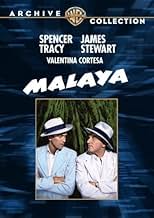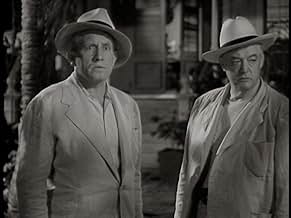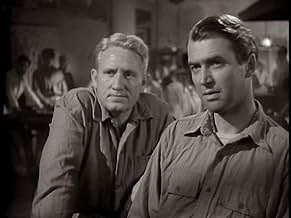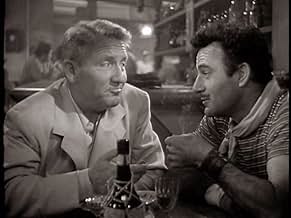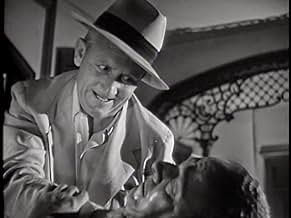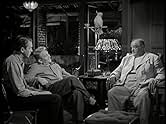IMDb RATING
6.5/10
1.6K
YOUR RATING
Newspaperman Royer convinces government officials of a plan to obtain rubber by smuggling it out from under the Japanese. Carnahan is let out of prison to help.Newspaperman Royer convinces government officials of a plan to obtain rubber by smuggling it out from under the Japanese. Carnahan is let out of prison to help.Newspaperman Royer convinces government officials of a plan to obtain rubber by smuggling it out from under the Japanese. Carnahan is let out of prison to help.
- Director
- Writers
- Stars
- Awards
- 2 wins total
Valentina Cortese
- Luana
- (as Valentina Cortesa)
Lester Matthews
- Matisson
- (scenes deleted)
Joel Allen
- Federal Agent
- (uncredited)
Besmark Auelua
- Henchman
- (uncredited)
George M. Carleton
- Small Businessman
- (uncredited)
Silan Chan
- Malay Girl
- (uncredited)
Spencer Chan
- Chinese Shipmaster
- (uncredited)
Joseph Crehan
- Businessman with Pipe
- (uncredited)
- Director
- Writers
- All cast & crew
- Production, box office & more at IMDbPro
Featured reviews
Malaya may seem a fantastic tale, but the story actually has quite a bit of truth to it. When World War II broke out the Japanese quickly conquered most of the rubber producing areas of the world. The modern mechanized army does run on rubber and both the USA and Germany developed types of synthetic rubber to be used.
My mother told me during World War II there were all kinds of drives for recyclable material and among the most valuable was rubber. People contributed all kinds of old tires for the war effort.
Lionel Barrymore plays the real life Manchester Boddy who was publisher of the Los Angeles Daily News who was the prime mover in the scheme you see portrayed here in Malaya. Though this story is fictional, the need for rubber in the USA was critical at the time and there was in fact a rubber smuggling operation going on.
Spencer Tracy before he came to MGM played just the kind of two fisted action heroes at Fox which was his original studio. He expressed an interest in doing this kind of film for old time sake and got cast in it. He really isn't poaching on Humphrey Bogart's territory these were the kind of roles he originally did in film while Bogey was playing hoods over at Warner Brothers.
Because the script called for a buddy team of heroes, James Stewart was approached and he even conceded top billing to Tracy. According to the Films of James Stewart, he admired Tracy as an actor so much that he was grateful just for the opportunity to work with him again. In fact Stewart's first film role was in Murder Man, a film that starred Spencer Tracy back in 1935.
With the two of these big stars in the leads, MGM was able to recruit a really outstanding group of players like John Hodiak, Valentina Cortese, Roland Winters, Richard Loo, the aforementioned Lionel Barrymore and my two favorites Gilbert Roland and Sydney Greenstreet.
Roland was shortchanged though. Watching Malaya I could tell his role as Tracy's adventurous friend was left on the cutting room floor. But even a little Gilbert Roland is always a pleasure to watch.
This was Sydney Greenstreet's last film and in it he essentially reprises the part of Ferrari in Casablanca. He's got the best lines in the film and his scenes with his cockatoo are classic. As he says, he's just a saloon keeper with an access to gossip. Which gets put to very good use.
Stewart the idealist, Tracy the cynical realist. Too bad they didn't work together more.
My mother told me during World War II there were all kinds of drives for recyclable material and among the most valuable was rubber. People contributed all kinds of old tires for the war effort.
Lionel Barrymore plays the real life Manchester Boddy who was publisher of the Los Angeles Daily News who was the prime mover in the scheme you see portrayed here in Malaya. Though this story is fictional, the need for rubber in the USA was critical at the time and there was in fact a rubber smuggling operation going on.
Spencer Tracy before he came to MGM played just the kind of two fisted action heroes at Fox which was his original studio. He expressed an interest in doing this kind of film for old time sake and got cast in it. He really isn't poaching on Humphrey Bogart's territory these were the kind of roles he originally did in film while Bogey was playing hoods over at Warner Brothers.
Because the script called for a buddy team of heroes, James Stewart was approached and he even conceded top billing to Tracy. According to the Films of James Stewart, he admired Tracy as an actor so much that he was grateful just for the opportunity to work with him again. In fact Stewart's first film role was in Murder Man, a film that starred Spencer Tracy back in 1935.
With the two of these big stars in the leads, MGM was able to recruit a really outstanding group of players like John Hodiak, Valentina Cortese, Roland Winters, Richard Loo, the aforementioned Lionel Barrymore and my two favorites Gilbert Roland and Sydney Greenstreet.
Roland was shortchanged though. Watching Malaya I could tell his role as Tracy's adventurous friend was left on the cutting room floor. But even a little Gilbert Roland is always a pleasure to watch.
This was Sydney Greenstreet's last film and in it he essentially reprises the part of Ferrari in Casablanca. He's got the best lines in the film and his scenes with his cockatoo are classic. As he says, he's just a saloon keeper with an access to gossip. Which gets put to very good use.
Stewart the idealist, Tracy the cynical realist. Too bad they didn't work together more.
Malaya (1949)
It would be nice to love this movie—with a strong theme of wartime ingenuity and bravery, and with three stellar actors—but by the end I was thinking everyone involved was just going through the motions. That's probably enough in many ways with people this naturally gifted on screen, and the movie is enjoyable, no question. With all the borrowings or references to earlier classics (Sydney Greenstreet even has a big bird as a pet, as in "Casablanca"), it makes for a fun time.
The premise starts with some very compact storytelling—a somewhat disreputable man (James Stewart) is overheard saying he could smuggle rubber out of British Malaya (now Malaysia). It's WWII and the Army likes the idea enough to send him off with an ex-con (Spencer Tracy) who knows the area well. (This is all arranged with the help of Lionel Barrymore in a small role.)
Then the adventure begins as they penetrate with surprising ease the rubber plantations and arrange with the generally friendly locals and ex-pats to get their hidden stockpiles. The Japanese do eventually catch on and there is fun there, but not before a couple of torch songs and some humorous excess as usual from the likable Greenstreet.
Frankly, things never get exciting or even suspenseful, though interesting all along. One huge problem (for me) was a complete lack of details. The two men would say, okay, let's go get this rubber here, and they meet the plantation owner and there is some talk and then suddenly they are going down the river with some little barges. The Japanese have no suspicions, and the local smugglers are all these cheerful Resistance Fighter types who really like to help a lot.
It would be fun to know if a young viewer finds this exotic and fun or laughable. It's somewhere between in all. And what honestly holds it together for anyone who likes the actors is just watching familiar faces in new roles. That is one of the endless interests of the movies.
See it? Sure, if you already like older films or WWII films. It's not bad. The director Richard Thorpe is quite unknown these days, but the cinematographer is a standard bearer of he period, George Folsey, and that makes every scenes look terrific. Yeah, it's not at all bad. But it ain't great, either.
It would be nice to love this movie—with a strong theme of wartime ingenuity and bravery, and with three stellar actors—but by the end I was thinking everyone involved was just going through the motions. That's probably enough in many ways with people this naturally gifted on screen, and the movie is enjoyable, no question. With all the borrowings or references to earlier classics (Sydney Greenstreet even has a big bird as a pet, as in "Casablanca"), it makes for a fun time.
The premise starts with some very compact storytelling—a somewhat disreputable man (James Stewart) is overheard saying he could smuggle rubber out of British Malaya (now Malaysia). It's WWII and the Army likes the idea enough to send him off with an ex-con (Spencer Tracy) who knows the area well. (This is all arranged with the help of Lionel Barrymore in a small role.)
Then the adventure begins as they penetrate with surprising ease the rubber plantations and arrange with the generally friendly locals and ex-pats to get their hidden stockpiles. The Japanese do eventually catch on and there is fun there, but not before a couple of torch songs and some humorous excess as usual from the likable Greenstreet.
Frankly, things never get exciting or even suspenseful, though interesting all along. One huge problem (for me) was a complete lack of details. The two men would say, okay, let's go get this rubber here, and they meet the plantation owner and there is some talk and then suddenly they are going down the river with some little barges. The Japanese have no suspicions, and the local smugglers are all these cheerful Resistance Fighter types who really like to help a lot.
It would be fun to know if a young viewer finds this exotic and fun or laughable. It's somewhere between in all. And what honestly holds it together for anyone who likes the actors is just watching familiar faces in new roles. That is one of the endless interests of the movies.
See it? Sure, if you already like older films or WWII films. It's not bad. The director Richard Thorpe is quite unknown these days, but the cinematographer is a standard bearer of he period, George Folsey, and that makes every scenes look terrific. Yeah, it's not at all bad. But it ain't great, either.
(Version reviewed is the 90-minute German-language showing on ARD on July 5, 2001.)
There are two rather unbecoming aspects about this movie, one being its blunt nationalism, the other one its odd casting. Where you would have expected, say, William Holden as the daring journalist and, well, Humphrey Bogart as the cynical hotshot, you get Jimmy and Spence. It's not that they don't act well, but the rôles just don't seem to fit. What a difference with handsome Mexican Gilbert Roland who is chosen perfectly (as Romano).
Journalist Royer (Stewart) gets his rival/friend Carnaghan (Tracy) out of prison with help from official sides (fine thesping by John Hodiak) for the good of the nation, that is, to haul all possible rubber out of British, but Jap-occupied, Malaya for the United States. Of course, the European land-owners give all assistance possible to support the sacred case, including a voluntary beating that Ian MacDonald gets from Tracy. America's raw nationalism was curiously carried right into the German translation: dubious Bruno Gruber (played by "Charlie Chan" Roland Winters) is named Marty Robber (or so) in German dubbing version of 1955, because a badman just couldn't have a German name to German audiences... This should be worth a correction, although the forgery effect is not as high as in the original 1952 dubbing of "Casablanca", that was corrected in a new version as late as in 1968. (Stewart, by the way, is synchronized well by Eckart Dux this time, not by regular Siegmar Schneider.)
Although film's humour is well-measured, it cannot conceal, but rather contributes to, the dare-devil chauvinism, four years after the war ended. Tracy played something of a contrary rôle in "Bad Day at Black Rock", as regards the U.S. relationship to the Japanese.
There's a lot of epigonism of "Casablanca", though not as much as in its immediate successors, in "Malaya". We have Richard Loo's Col. Tomura marching into the bar like Maj. Strasser; Italy's Cortese in the European female part (the story might have done without her, were there not some nice dialogues with Tracy); and the wonderful Sydney Greenstreet, who somewhat resumes his Senor Ferrari rôle (that parrot of his is a blue one, I suppose).
Despite this emulation, Frank Fenton's screenplay has something interesting about it that makes this movie agreeable after all. But it wouldn't have taken the famous leading players, close to miscasts, for something that appears like an MGM "B" production to me. - Worst thing is, I couldn't spot DeForest "Bones" Kelley anywhere around, although he is said to be there.
There are two rather unbecoming aspects about this movie, one being its blunt nationalism, the other one its odd casting. Where you would have expected, say, William Holden as the daring journalist and, well, Humphrey Bogart as the cynical hotshot, you get Jimmy and Spence. It's not that they don't act well, but the rôles just don't seem to fit. What a difference with handsome Mexican Gilbert Roland who is chosen perfectly (as Romano).
Journalist Royer (Stewart) gets his rival/friend Carnaghan (Tracy) out of prison with help from official sides (fine thesping by John Hodiak) for the good of the nation, that is, to haul all possible rubber out of British, but Jap-occupied, Malaya for the United States. Of course, the European land-owners give all assistance possible to support the sacred case, including a voluntary beating that Ian MacDonald gets from Tracy. America's raw nationalism was curiously carried right into the German translation: dubious Bruno Gruber (played by "Charlie Chan" Roland Winters) is named Marty Robber (or so) in German dubbing version of 1955, because a badman just couldn't have a German name to German audiences... This should be worth a correction, although the forgery effect is not as high as in the original 1952 dubbing of "Casablanca", that was corrected in a new version as late as in 1968. (Stewart, by the way, is synchronized well by Eckart Dux this time, not by regular Siegmar Schneider.)
Although film's humour is well-measured, it cannot conceal, but rather contributes to, the dare-devil chauvinism, four years after the war ended. Tracy played something of a contrary rôle in "Bad Day at Black Rock", as regards the U.S. relationship to the Japanese.
There's a lot of epigonism of "Casablanca", though not as much as in its immediate successors, in "Malaya". We have Richard Loo's Col. Tomura marching into the bar like Maj. Strasser; Italy's Cortese in the European female part (the story might have done without her, were there not some nice dialogues with Tracy); and the wonderful Sydney Greenstreet, who somewhat resumes his Senor Ferrari rôle (that parrot of his is a blue one, I suppose).
Despite this emulation, Frank Fenton's screenplay has something interesting about it that makes this movie agreeable after all. But it wouldn't have taken the famous leading players, close to miscasts, for something that appears like an MGM "B" production to me. - Worst thing is, I couldn't spot DeForest "Bones" Kelley anywhere around, although he is said to be there.
Spencer Tracy and James Stewart preside over a terrific cast in "Malaya," a 1949 film also starring Valentina Cortese, Sydney Greenstreet, John Hodiak, Lionel Barrymore, Roland Winters and Gilbert Roland.
This is a fictional account of a very real situation involving the shortage of rubber during World War II. Japan really dominated the countries that had the rubber, and there was smuggling of rubber to the U.S. The situation involving Tracy and Stewart, however, never happened.
Tracy plays a con named Carnahan, whom the government releases from Alcatraz in order to spearhead this project, and Stewart plays John Royer, a former reporter with a shady enough past that the government (represented by John Hodiak) thinks he's a good bet to go into Malaya and smuggle tons of rubber out of that country and pay with gold. Carnahan knows the country like the back of his hand and has the connections. He and Royer pose as Irish sailors looking for work in order to get around a suspicious Colonel Tomura (Richard Loo) while they are helped by an old friend of Carnahan's, The Dutchman (Sydney Greenstreet). Cortese has the Dietrich role, that of a singer in love with Carnahan.
There are some exciting scenes in this film, and it holds one's attention. One of the best performances comes from Gilbert Roland, who leads the smugglers handpicked by The Dutchmen. He's very convincing.
As for Tracy and Stewart, well, although Tracy started out in tough guy Wallace Beery roles, 1949 was a little late for him to be taking them up again. Actually Hodiak would have been good, or Bogart, or John Wayne, Jimmy Cagney, someone along those lines. I thought Stewart was very good and that the two of them made an effective team. Someone said he came off as a nice guy. I thought he did cynic and hardboiled well. You can be cynical and hardboiled and averse to physical violence.
All in all, pretty good.
This is a fictional account of a very real situation involving the shortage of rubber during World War II. Japan really dominated the countries that had the rubber, and there was smuggling of rubber to the U.S. The situation involving Tracy and Stewart, however, never happened.
Tracy plays a con named Carnahan, whom the government releases from Alcatraz in order to spearhead this project, and Stewart plays John Royer, a former reporter with a shady enough past that the government (represented by John Hodiak) thinks he's a good bet to go into Malaya and smuggle tons of rubber out of that country and pay with gold. Carnahan knows the country like the back of his hand and has the connections. He and Royer pose as Irish sailors looking for work in order to get around a suspicious Colonel Tomura (Richard Loo) while they are helped by an old friend of Carnahan's, The Dutchman (Sydney Greenstreet). Cortese has the Dietrich role, that of a singer in love with Carnahan.
There are some exciting scenes in this film, and it holds one's attention. One of the best performances comes from Gilbert Roland, who leads the smugglers handpicked by The Dutchmen. He's very convincing.
As for Tracy and Stewart, well, although Tracy started out in tough guy Wallace Beery roles, 1949 was a little late for him to be taking them up again. Actually Hodiak would have been good, or Bogart, or John Wayne, Jimmy Cagney, someone along those lines. I thought Stewart was very good and that the two of them made an effective team. Someone said he came off as a nice guy. I thought he did cynic and hardboiled well. You can be cynical and hardboiled and averse to physical violence.
All in all, pretty good.
If this movie did not have Jimmy Stewart and Spencer Tracy, the film wouldn't have even merited a score of five. It was a very uninspiring and forgettable wartime film made several years after the war actually ended. It just seemed like all the energy was missing from the film. In fact, about the only energy came from Sidney Greenstreet's pet bird--now that bird can act! Another problem with the film is the idea of casting Spencer Tracy in the role of a selfish, devil-may-care smuggler in Alcatraz at the beginning of the film. The believability of the performance didn't improve once he made it to Malaya. This is actually the sort of role I might have expected for Clark Gable or maybe even Errol Flynn (yes, I know he was with a different studio), but for Tracy, an actor who often was cast as the priest or nice guy, it just wasn't terribly convincing. Plus, he just acted too nice to be as seedy as they described him as being.
In the end, the only interesting thing about this film is how so much money was spent on the cast and so little bang was achieved for MGM's buck. This is purely a time-passer or film for those devotees of Stewart or Tracy.
In the end, the only interesting thing about this film is how so much money was spent on the cast and so little bang was achieved for MGM's buck. This is purely a time-passer or film for those devotees of Stewart or Tracy.
Did you know
- TriviaSydney Greenstreet's final film.
- GoofsOne scene features wild chimpanzees. Chimps are natives of Africa, not Malaya.
- Quotes
John Royer: You have to remember, this guy's a German.
Carnaghan: Yeah, but he's a greedy man, and greed has a nationality all its own.
- ConnectionsEdited from Les sacrifiés (1945)
- SoundtracksBlue Moon
(uncredited)
Written by Richard Rodgers and Lorenz Hart
Performed by Valentina Cortese (as 'Luana'), also whistled by James Stewart
- How long is Malaya?Powered by Alexa
Details
Box office
- Budget
- $2,396,000 (estimated)
- Runtime
- 1h 38m(98 min)
- Color
- Aspect ratio
- 1.37 : 1
Contribute to this page
Suggest an edit or add missing content

